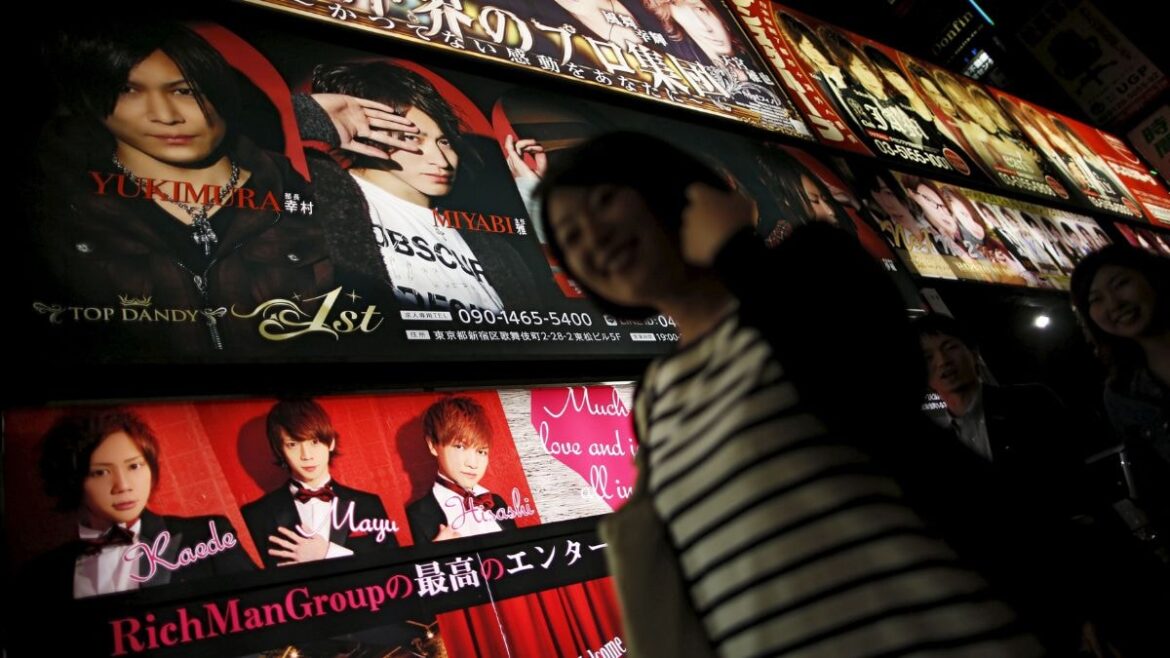In the heart of Tokyo’s nightlife district, host clubs have long been a curious part of Japanese culture. Places where women pay big bucks to sip champagne and share flirtatious banter with sharply dressed young men who know exactly how to make them feel special.
But behind the glitz and fun, a darker side is coming to light.
Authorities in
Japan are now cracking down on these clubs, saying some of them are exploiting vulnerable women, luring them into heavy debts, emotional manipulation, and even prostitution. With growing concern from victims’ groups, media, and police, the government is finally stepping in to regulate an industry many say has gone too far.
STORY CONTINUES BELOW THIS AD
Here’s a look at what host clubs really are, why they’re under the scanner, and how the crackdown is affecting lives on both sides of the bar.
Inside the host club culture in Japan
Host clubs are nightlife venues where women pay to spend time with attractive, sharply dressed men, known as “hosts”, who shower them with attention, conversation, and drinks, often bought at highly inflated prices.
But these drinks don’t come cheap. A simple bottle of sparkling water can cost as much as 6,000 yen (around Rs 3,500), and over-the-top champagne towers can run up tabs in the millions.
A male host waiting for customers at a host club in the Kabukicho area of Tokyo. File image/AFP
The hosts cultivate a sense of intimacy or romantic affection, often encouraging repeat visits and lavish spending via flattery, playful banter, and even messages that suggest affection.
John Reno, a popular host and owner of Club J in Tokyo’s red-light district Kabukicho, told _AFP, “_Hosts used to employ intimacy primarily to entertain women.” But according to him, things have changed.
“Their mindset today is basically, ‘If you love me, then don’t complain,’” he said, suggesting that emotional manipulation has become more common. “It silences women and exploits their emotional dependence.”
STORY CONTINUES BELOW THIS AD
For some women, the connection with a host becomes a central part of their emotional world. In return, they may return night after night, spending tens of thousands of yen, sometimes going into debt to maintain the attention of their favourite host.
According to Arata Sakamoto, who runs the non-profit Rescue Hub in Kabukicho, many of these clients are not wealthy professionals, but vulnerable women seeking comfort and belonging.
Host clubs can face fines of up to £1.5m and the law now forbids tactics like pressuring clients with threats to deny access to their favourite host. File image/ AFP
“To them, host clubs have become a place where they feel accepted,” he told AFP. “It reassures them that they can be who they are, albeit in exchange for money.”
Why are authorities cracking down?
The Japanese government has begun cracking down on host clubs, following a growing number of complaints and police reports alleging emotional exploitation, financial manipulation, and in some cases, sex trafficking.
Under a new law that came into effect in June 2025, hosts are now prohibited from manipulating women into buying overpriced drinks by playing on their romantic feelings.
STORY CONTINUES BELOW THIS AD
The legislation specifically targets behaviour that threatens to end a “relationship” if a client refuses to spend more, something victims’ groups say has become common in recent years.
“It’s exactly the same as a religious cult, the way the clubs manipulate and brainwash the women. They use a manual to target women and give them their first visits free to rein them in,” Founder Hidemori Gen said at Foreign Correspondents Club for Japan press conference in December 2024.
While high-flying businesswomen used to be the main clientele, girls “with no place to be” are increasingly seeking refuge, according to non-profit Rescue Hub. AFP
According to official data cited by AFP, host club-related police cases jumped from 2,100 in 2022 to 2,800 in 2024. These cases range from hosts ordering drinks without consent to more serious claims of coercion into prostitution.
Also read: Taiwan’s last ‘comfort woman’ dies: The history of World War II sex slaves
Police say some hosts, facing pressure to meet sales targets, go as far as introducing cash-strapped clients to “scouts”. They are brokers who recruit women into the sex industry as a way to clear their debts.
One unnamed woman told The Japan Times she racked up 1.6 million yen in two months and later turned to sex work, earning up to 500,000 yen a month while sleeping in internet cafés. “All that money went to the host,” she said.
Authorities are also tightening regulations on host club marketing. Neon-lit billboards boasting “No.1” host titles and flashy slogans like “King” or “god” are now banned. Police argue these rankings promote aggressive sales behaviour and unhealthy competition, encouraging hosts to push clients harder for money.
STORY CONTINUES BELOW THIS AD
Platina, one of Kabukicho’s most prominent host clubs, had to tape over promotional slogans on its signage in response.
“It’s been the aspiration of many hosts to be called No.1, earn a title, and become famous in this town,” said Platina’s owner, Ran Sena. “Now, they don’t even know what they should strive for.”
Authorities are also tightening regulations on host club marketing. Neon-lit billboards boasting “No.1” host titles and flashy slogans like “King” or “god” are now banned. AFP
For women, too, the rankings were a way to reassure themselves that the money they spent on their “oshi” (favourite) hosts was not in vain – proof they were helping them ascend in the cut-throat hosts industry.
“I think the industry is heading towards decline,” Sena said.
With input from agencies


AloJapan.com